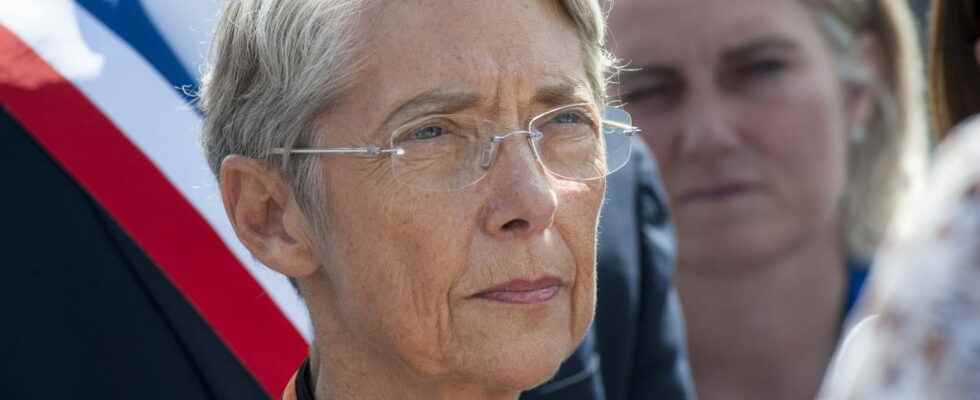PURCHASING POWER LAW. Prime Minister Elisabeth Borne announced this Tuesday, June 7 the establishment of new aid to fight inflation for low-income households. When ? How it works ? We tell you everything.
[Mis à jour le 7 juin 2022 à 14h23] This Tuesday, June 7, Prime Minister Elisabeth Borne spoke on the subject of purchasing power and inflation and announced the introduction of a brand new aid measure for the most deprived in order to fight against galloping inflation (+5.2% in May over one year) “paid on return“particularly in the face of soaring food prices.”This will be aid paid directly into the bank account, all at once, naturally taking into account the number of children in the family.” she said at the microphone of France Bleu on Tuesday. Could this new emergency aid be part of the purchasing power bill hatched by the Prime Minister? Nothing has yet been announced in this direction.
The deadline is approaching, the announcement of the purchasing power bill should take place after the legislative elections of 12 and 19 June next in the event of a majority obtained in the National Assembly by LREM. A project in favor of the purchasing power of the French which should bring together several flagship promises ofEmmanuel Macron during his presidential campaign such as the tripling of the Macron bonus, the abolition of the TV license fee or the indexation of pensions to inflation. rising inflation, +5.2% in May over a year. The text of the purchasing power bill will be detailed by the Prime Minister Elisabeth Borne in the Council of Ministers on June 29 next, then presented to the National Assembly in stride.
The proposals are not lacking, but the promulgation of this law should still be expected. Why ? Quite simply because the new National Assembly has not yet been formed. For the moment, this project remains to be taken with tweezers. It is totally suspended on the results of the legislative elections next June. Indeed, the slew of measures promised by Emmanuel Macron and his government remains subject to the dynamics that will emerge from the ballot. The Republic En Marche and its gathering “Together !“Will she get the majority? This is the main question. If this is not the case, the project could be widely called into question, or even completely abandoned. In the event of cohabitation, it could be difficult for the head of the State to impose this project on its Prime Minister and to have it voted on by a divided assembly Response on 19 June next during the second round of the legislative elections.
The rise in consumer prices is expected to continue in the coming months. INSEE predicts an increase between 5% and 5.4% next May, enough to push the government to act, by proposing a salvo of measures to try to support modest households and low wages. In this sense, several proposals already mentioned by the executive for many weeks should indeed come into force. Here they are :
- Food voucher: its amount could reach 60 euros and should benefit young people aged 18 to 25, as well as low-income families with children. The measure could affect 8 million people in France with the aim of allowing low wages to consume French, organic, and preferably in short circuits.
- Macron bonus: the Head of State intends to triple the amount of the exceptional purchasing power bonus to reach up to 6,000 euros in certain cases. It concerns employees whose salary does not exceed 3x the minimum wage.
- RSA: the active solidarity income should be conditional on a minimum of activity on the part of the beneficiaries. The most likely track remains 20 hours of training per month. A way for the executive to promote the return to employment.
- TV fee: it was a campaign promise the audiovisual fee will be abolished in 2022. Its amount was 138 euros in mainland France and 88 euros in Overseas for each household with a television.
- Indexation of pensions to inflation: In addition to the introduction of a minimum pension of 1,100 euros, Emmanuel Macron wishes to index retirement pensions to the level of inflation to take into account the sharp rise in prices which should be durable.
- Fuel bonus: the government could extend the discount of 18 cents on a liter of fuel, and even set up new, more targeted aid for those who have no choice but to use their vehicle to get to their workplace.
As announced by the spokesperson for the current government Gabriel Attalthe various measures forming part of the purchasing power law should be announced “after the legislative elections“. A way of respecting the timetable set by Emmanuel Macron and his various media outlets, regularly announcing the implementation of these measures by the summer. The legislative elections will be held on June 12 and 19. An announcement of the purchasing power bill is therefore not to be expected before, at least, next June 20.
